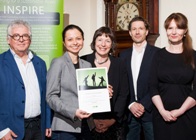Shakespeare and sustainability

Presentation of the INSPIRE award: from the left, Professor Howard Thomas, Dr Adeline Johns-Putra, director of INSPIRE Jane Davidson, Professor Richard Marggraf Turley, and Dr Jayne Elisabeth Archer.
23 May 2013
Dr Jane Elizabeth Archer and Professor Richard Marggraf Turley from the Department of English and Creative Writing, and Professor Howard Thomas from the Institute of Biological, Environmental and Rural Sciences, will take to the Hay Festival stage today, Thursday 23 May, to deliver a hotly anticipated public lecture which will examine the works of William Shakespeare through a sustainability lens.
The lecture, ‘Reading with the Grain: Sustainability and the Literary Imagination’, was recently announced as the winner of a prestigious competition to showcase research which explores the relationship between literature and the sustainability debate.
Led by Dr Jayne Archer, the lecture will show how issues of food in Shakespeare’s day – its availability, its scarcity, and questions about who controlled food supplies – were crucial to both the playwright himself and to his plays.
The competition was organised by the University of Wales Trinity Saint David’s Institute of Sustainable Practice, Innovation and Resource Effectiveness (INSPIRE) in collaboration with the Association for the Study of Literature and Environment, UK & Ireland (ASLE-UKI).
The aim of the competition was to give literary scholars the chance to engage with the idea of sustainability by writing a public lecture which would pursue literary study in the light of sustainability issues.
The lecture will be followed by a public discussion between Dr Archer and Professor Marggraf Turley, Professor Howard Thomas, director of INSPIRE Jane Davidson, and ASLE-UKI chair Dr Adeline Johns-Putra, during which they will debate how sustainability insights taken from literature can offer new interpretations of the world as we know it.
The lecture will take place at 7pm on the Festival’s Landmarc 100 Stage. The lecture will invite the audience to reconsider Shakespeare’s writing to find imaginative insights into engaging sceptically and stringently with the future.
AU18113



